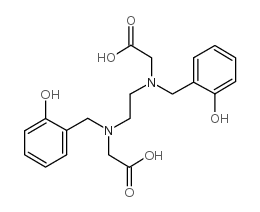35369-53-0
| 中文名 | N,N-二(2-羟基苯基)亚乙基二胺-N,N-二乙酸盐酸盐 |
|---|---|
| 英文名 | hbed hcl h2o |
| 中文别名 |
去羟基-N,N'-二(2-羟基苄基)乙二胺-N,N'-二乙酸盐酸盐(HBED)
N,N-二(2-羟基苯基)亚乙基二胺-N,N'-二乙酸盐酸盐 |
| 英文别名 | hbed 2hcl 2h2o |
| 描述 | HBED二盐酸盐是一种口服活性六齿酚氨基羧酸铁螯合剂。HBED指的是N,N'-双(2-羟基苄基)乙二胺-N,N'--二乙酸,在灵长类动物中诱导铁排泄。HBED二盐酸盐有潜力作为去铁胺的替代品用于铁螯合治疗[1]。 |
|---|---|
| 相关类别 | |
| 体内研究 | HBED一盐酸盐二水合物在不同的给药方式下,产生的活性不同。赫贝德以 81、162和 324μMol/kg的剂量,口服给药后不会产生显著效果。而以 162和 324μMol/kg的剂量,在皮下给药后,提高了净铁排泄量[1] |
| 参考文献 |
| 熔点 | 130-134ºC |
|---|---|
| 分子式 | C20H26Cl2N2O6 |
| 分子量 | 461.34 |
| 精确质量 | 388.16300 |
| PSA | 121.54000 |
| LogP | 1.57120 |
| 外观性状 | 白色至灰白色固体 |
| 储存条件 | 密封、在2 ºC -10 ºC下保存 |
| 稳定性 | 常规情况下不会分解,没有危险反映 |
| 计算化学 | 1.疏水参数计算参考值(XlogP):-2.8 2.氢键供体数量:4 3.氢键受体数量:8 4.可旋转化学键数量:11 5.互变异构体数量:5 6.拓扑分子极性表面积122 7.重原子数量:28 8.表面电荷:0 9.复杂度:459 10.同位素原子数量:0 11.确定原子立构中心数量:0 12.不确定原子立构中心数量:0 13.确定化学键立构中心数量:0 14.不确定化学键立构中心数量:0 15.共价键单元数量:1 |
| 更多 | 1. 性状: 未确定 2. 密度(g/mL,25/4℃):未确定 3. 相对蒸汽密度(g/mL,空气=1): 未确定 4. 熔点(ºC):未确定 5. 沸点(ºC,8mm hg): 未确定 6. 沸点(ºC,5.2kPa):未确定 7. 折射率:未确定 8. 闪点(ºC):未确定 9. 比旋光度(º):未确定 10. 自燃点或引燃温度(ºC): 未确定 11. 蒸气压(kPa,25ºC):未确定 12. 饱和蒸气压(kPa,60ºC): 未确定 13. 燃烧热(KJ/mol):未确定 14. 临界温度(ºC):未确定 15. 临界压力(KPa):未确定 16. 油水(辛醇/水)分配系数的对数值:未确定 17. 爆炸上限(%,V/V):未确定 18. 爆炸下限(%,V/V):未确定 19. 溶解性:未确定 |
|
Section 1: Product Identification Chemical Name:N,N'-Di(2-hydroxybenzyl)ethylenediamine-N,N'-diacetic acid monohydrochloride hydrate HBED CAS Registry Number:35369-53-0 Formula:C20H24N2O6.HCl.XH2O EINECS Number:none Chemical Family:organic amine Synonym:none
Section 2: Composition and Information on Ingredients IngredientCAS NumberPercentACGIH (TWA)OSHA (PEL) Title Compound35369-53-0100%no datano data Section 3: Hazards Identification Emergency Overview:No particular hazard associated with this material. Primary Routes of Exposure:Ingestion, inhalation Eye Contact:May cause slight to mild irritation of the eyes. Skin Contact:May cause slight to mild irritation of the skin. Inhalation:May be irritating to the nose, mucous membranes and respiratory tract. Ingestion:No specific information is available on the physiological effects of ingestion. Acute Health Affects:May be irritating to skin, eyes and respiratory tract. Chronic Health Affects:No information available on long-term chronic effects. NTP:No IARC:No OSHA:No SECTION 4: First Aid Measures Immediately flush the eyes with copious amounts of water for at least 10-15 minutes. A victim may need Eye Exposure: assistance in keeping their eye lids open. Get immediate medical attention. Wash the affected area with water. Remove contaminated clothes if necessary. Seek medical assistance if Skin Exposure: irritation persists. Remove the victim to fresh air. Closely monitor the victim for signs of respiratory problems, such as difficulty Inhalation: in breathing, coughing, wheezing, or pain. In such cases seek immediate medical assistance. Seek medical attention immediately. Keep the victim calm. Give the victim water (only if conscious). Induce Ingestion: vomiting only if directed by medical personnel. SECTION 5: Fire Fighting Measures Flash Point:no data Autoignition Temperature:none Explosion Limits:none Extinguishing Medium:carbon dioxide, dry powder or foam If this material is involved in a fire, fire fighters should be equipped with a NIOSH approved, positive pressure Special Fire Fighting Procedures: self contained breathing apparatus and full protective clothing. Hazardous Combustion andIf involved in a fire this material may emit toxic organic fumes. Decomposion Products: Unusual Fire or Explosion Hazards: No unusual fire or explosion hazards. SECTION 6: Accidental Release Measures Spill and Leak Procedures:Small spills can be mixed with vermiculite or sodium carbonate and swept up. SECTION 7: Handling and Storage Handling and Storage:Store in a tightly sealed container. Keep away from heat and direct sunlight. SECTION 8: Exposure Controls and Personal Protection Eye Protection:Always wear approved safety glasses when handling a chemical substance in the laboratory. Skin Protection:Wear protective clothing and gloves. Ventilation:Material may form a fine dust. If possible, handle the material in an efficient fume hood. If ventilation is not available a respirator should be worn. The use of respirators requires a Respirator Respirator: Protection Program to be in compliance with 29 CFR 1910.134. Ventilation:Material may form a fine dust. If possible, handle the material in an efficient fume hood. Additional Protection:No additional protection required. SECTION 9: Physical and Chemical Properties Color and Form:off-white pwdr. Molecular Weight:424.89 Melting Point:130-134° Boiling Point:no data Vapor Pressure:not applicable Specific Gravity:no data Odor:none Solubility in Water:soluble SECTION 10: Stability and Reactivity Stability:air and moisture stable solid Hazardous Polymerization:no hazardous polymerization Conditions to Avoid:none Incompatibility:Oxidizing agents and halogens Decomposition Products:carbon dioxide, carbon monoxide, nitrogen oxides, hydrogen chloride, and organic fumes SECTION 11: Toxicological Information RTECS Data:No information available in the RTECS files. Carcinogenic Effects:No data available Mutagenic Effects:No data available Tetratogenic Effects:No data available SECTION 12: Ecological Information Ecological Information:No information available SECTION 13: Disposal Considerations Disposal:Dispose of according to local, state and federal regulations. SECTION 14: Transportation Shipping Name (CFR):Non-hazardous Hazard Class (CFR):NA Additional Hazard Class (CFR):NA Packaging Group (CFR):NA UN ID Number (CFR):NA Shipping Name (IATA):Non-hazardous Hazard Class (IATA):NA Additional Hazard Class (IATA):NA Packaging Group (IATA):NA UN ID Number (IATA):NA SECTION 15: Regulatory Information TSCA:Not listed in the TSCA inventory. SARA (Title 313):Not reportable under SARA Title 313 Second Ingredient:none SECTION 16 - ADDITIONAL INFORMATION N/A |
|
生态学数据: 对水是稍微有危害的不要让未稀释或大量的产品接触地下水、水道或者污水系统,若无政府许可,勿将材料排入周围环境
|
| 风险声明 (欧洲) | 36/37/38 |
|---|---|
| 安全声明 (欧洲) | 26-36/37/39 |


